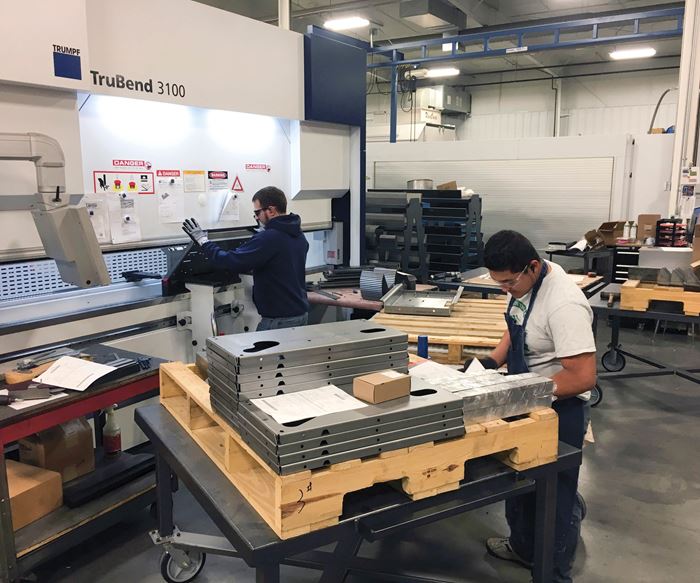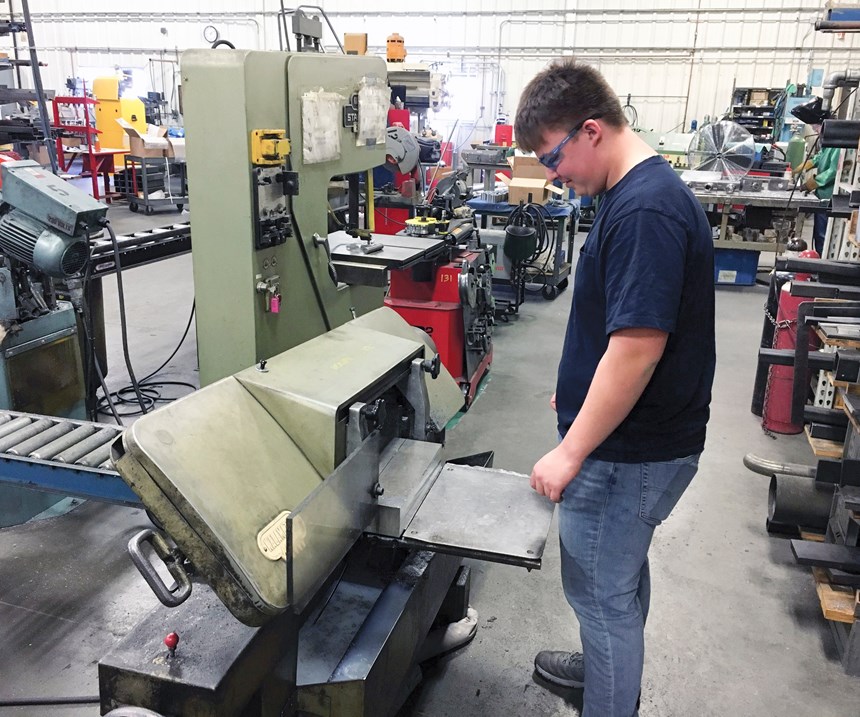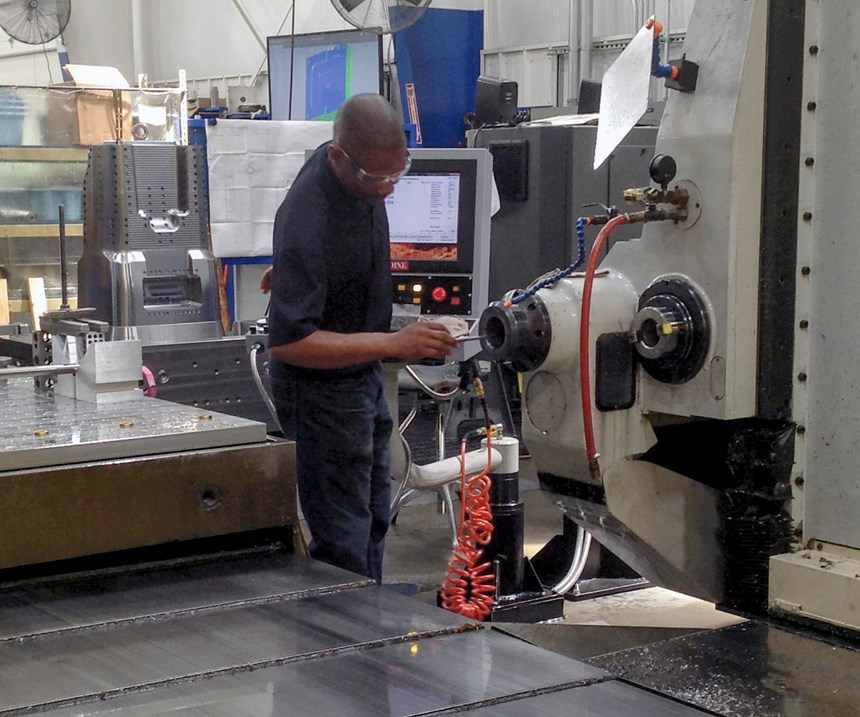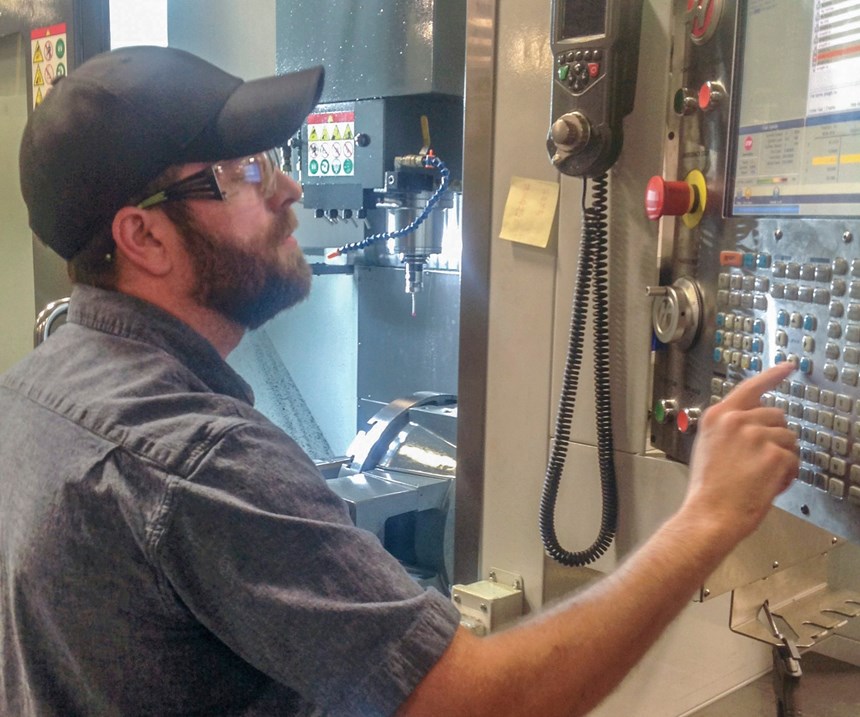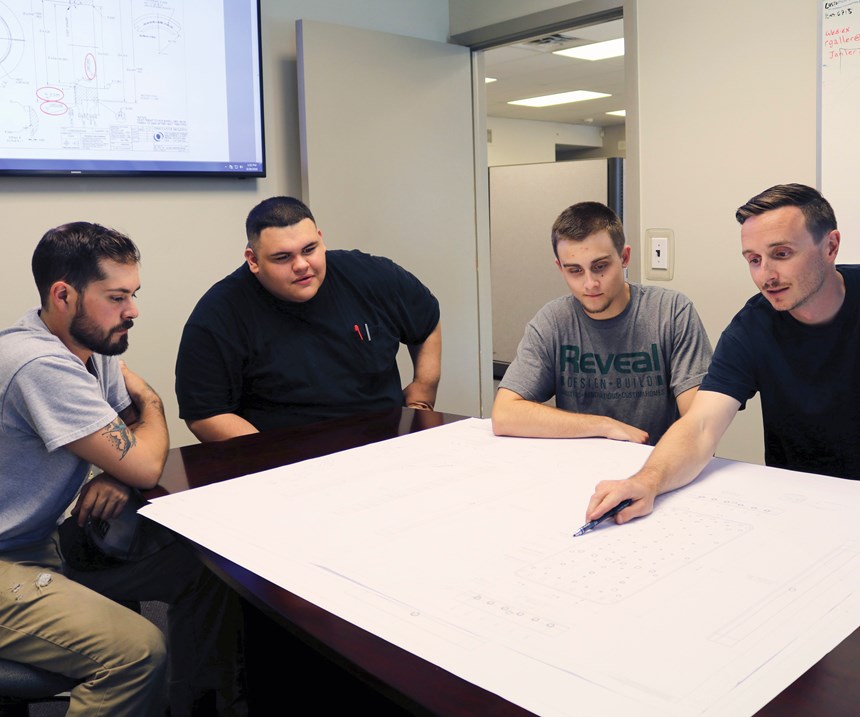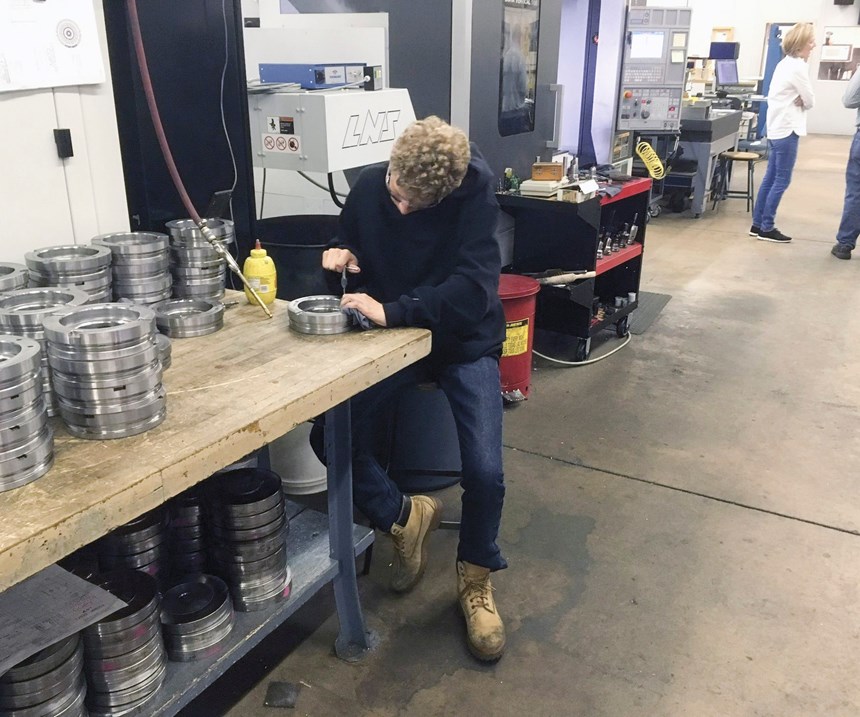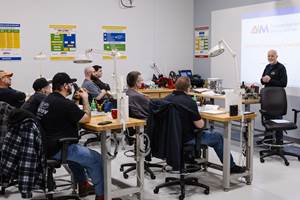MoldMaking Technology has covered a variety of workforce development programs in recent months. Across North America, these programs often reveal a common thread of collaboration and mentorship. We interviewed three shops to find yet more commonality: Shops are expanding their outreach to younger candidates and are teaching life skills in addition to moldmaking skills.
Forging Career Pathways in High School to Produce Better-Prepared Workforce
Apprenticeships work a little differently in Grand Island Nebraska, the location of Dramco Tool Co. Larry Patten is an owner of Dramco, which specializes in building dies and injection and compression molds with capacities ranging to 1,000 tons. The company has a 37,000-square-foot facility and employs 45 workers, three of whom were recently hired out of a local community college. “We have never had a formal apprenticeship program at Dramco,” Patten says. “A number of years ago, we started to focus on hiring students from a two-year technical college program to work part-time in the shop. We offered them the possibility of full-time employment after they had taken the required courses and graduated.”
In the past, Dramco typically hired about 90 percent of its employees after they had graduated with advanced, technical manufacturing degrees. The new hires came out of community college having learned basic machining skills, Patten says, and they had learned how to build and run a basic mold. That recruitment scenario has changed in recent years.
In 2009, Dramco became part of a task force that would ultimately develop Nebraska’s first Career Pathways Institute (CPI), which is geared toward providing career and technical training for students in the Grand Island Public School District and surrounding rural districts. Patten says that it took four years for the CPI to open its doors (it occupies a 66,000-square-foot manufacturing plant formerly owned by Pentair). The opening of the CPI provided new opportunities for Dramco to recruit students at a younger age. This is because high school juniors and seniors gain exposure to manufacturing skills via the Skilled and Technical Sciences pathway, which is one of 10 career pathways that the program offers. Budding machinists, tool and die makers, engineers and others learn entry-level job skills in an industrial setting that sets them on a pathway for success in their chosen career or prepares them for continuing education opportunities like college. They learn about manual mills and lathes, machine tools, CNC machining, surface grinders, welding and more using the latest equipment from companies like Haas Automation (Oxnard, California) and metalworking-machine supplier Productivity Inc. (Omaha, Nebraska). Guest speakers, facility tours and hands-on activities help to round out the curriculum. “Since our Career Pathways Institute opened, at least four more have opened across Nebraska that operate in a similar way,” Patten says.
“Instead of working only with high school graduates through the community college programs, we’re now starting sooner with high school juniors,” Patten says. “We bring them into our shop during the summer and after school to work part-time. It is important to get our prospects incorporated into the shop culture. They establish relationships with the current employees and become a part of the Dramco Team, which eases the transition from school culture to work culture. In turn, they can put some of the new skills they learn with us to use in the CPI program while they are still in school.”
It is important to get our prospects incorporated into the shop culture. They establish relationships with the current employees and become a part of the Dramco Team, which eases the transition from school culture to work culture.
Upon graduating high school, the students go directly into the community college program. They have already earned the first semester credit because of their participation with the Career Pathways Institute. While there is no guarantee of full-time employment, Patten says that during the remaining 1.5 years at the college, Dramco still brings apprentices in to work part-time. “We will typically have three to five apprentices working here at any given time, doing work that ranges from keeping the shop clean to doing basic CNC machine work. It gives us the opportunity to choose who we want to hire at the end based on 3.5 years of experience that we have working with them in our shop,” he says.
Dramco works with the instructors at the college (one of whom is a former employee who wanted to teach) when they are looking for new talent or when the school needs some assistance. For example, Patten and his partners visit CPI from time to time to interact with the instructors and the students. Dramco employees answered the call for help with a specific area of programming or machining, and the company has helped with building small tools or shop equipment that the school needed. “We also serve on the advisory boards of both CPI and Central Community College (CCC) to give advice on curriculum and program focus,” Patten says. “When a program like this is tuned in to the needs of the industry, it helps companies like Dramco to be very successful.”
When a program like this is tuned in to the needs of the industry, it helps companies like Dramco to be very successful.
Last November, the State of Nebraska implemented an apprenticeship policy that allows apprentices as young as 16 or 17 to perform basic machining like grinding, deburring and some milling work while learning a trade. Previously, the law required younger employees to wait until they were 18. Patten says that this affords his company the chance to teach apprentices not only basic machining, but the value of working efficiently and what it takes to complete a job on time. “We’re selling time, so it is critical that a new employee understands that it makes a big difference on the profit side if he or she finishes a job in a half-hour versus an hour. That’s a concept that individuals don’t always get,” he says.
Dramco has a scholarship program designed to help students as they go through their apprenticeships. “We budget annually for several $500-scholarship awards, some of which are awarded through the high-school CPI program,” Patten says. “We also work directly through the community college, letting them know that we have scholarships available, and the will send us candidates. Other times, those who are working for us part-time will get scholarship help.”
Apprentices who graduate and are hired full-time at Dramco spend the first year further honing their skills based on the company’s tiered work system. Patten says that there are three designated tiers of toolmakers ranging from entry level to lead toolmaker. Each tier lists the skills and recommended tools required to excel at that tier. For example, a Tier 2 toolmaker hired right out of school can begin working with a lead toolmaker straightaway. “We try to tailor each employee’s position within the company to his or her personality and skill set. We are finding that most employees that we hire out of school have rendered our Tier 1 classification useless since they are starting with skills required for Tier 2. The jump to Tier 3 is focused on better decision making and skills that are learned from experience as opposed to what might be termed as basic toolmaking skills. Our goal is to challenge every employee according to his or her individual capabilities. Working with these new programs has resulted in fast-tracking our new employees into productive employees sooner than in the past,” Patten says.
Blazing Multiple Trails to Successful Recruitment and Training
MSI Mold Builders (MSI) in Cedar Rapids, Iowa, has a system in place for attracting, recruiting and training new talent that will become its lifeblood for the future. This three-time Leadtime Leader honoree has shared many of its best practices in features published by MoldMaking Technology but until now has only provided a glance into its workforce development program.
It should be noted that at this year’s American Mold Builders Association (AMBA) annual conference, MSI became the second recipient of the organization’s national Tooling Trailblazer Award. AMBA uses the award to honor a member shop that has made a notable impact on the industry through various educational outreach programs. Along with an award to display, MSI also received a $5,000 scholarship check from Progressive Components (Wauconda, Illinois) and has donated it to Kirkwood Community College (KCC), a Cedar Rapids-based institution with which MSI has had a longtime partnership supporting advanced manufacturing and CNC education programs. “It feels great to win this award, especially because it comes from the AMBA and our peers,” MSI President Roger Klouda says. “A lot of companies are working hard to promote moldmaking and advanced manufacturing careers at the educational institute level, and for AMBA to recognize us among this group is extra special.”
A lot of companies are working hard to promote moldmaking and advanced manufacturing careers at the educational institute level, and for AMBA to recognize us among this group is extra special.
Klouda says that historically, MSI’s relationship with KCC goes back at least 40 years and that a good percentage of his employees have come through the training there. “A lot has changed since the early years. Back then, more traditional training was available. Today, people are more specialized in the jobs that they do,” he says. “In fact, to stay alive years ago when there were not enough mold shops in the area to have much of a formal apprenticeship program, the companies that were here got together and worked with the State of Iowa to organize training via the Iowa Cable Network (ICN).” He explains that through this collaboration, several high schools and colleges worked together to provide live training over closed circuit television. “Apprentices had direct interaction with the instructors. We would have an apprentice in Fort Dodge or five apprentices from Cedar Rapids, one in Belle Plaine, two more in Des Moines and different people from different companies trained everyone over the ICN. It worked really well until about 2000 when the industry went to hell and everyone stopped hiring.”
Klouda says that in 2001, MSI made the transition from a trade-based to a production-based system when the company assessed and reassigned employees to departments where the employees could specialize and excel. The company’s apprenticeship program evolved as well, and by about 2008, it became the intern-type program that is in place today.
MSI’s intern-style program is like more traditional apprenticeships in that new recruits are expected to attend classes at KCC or another approved local college while also gaining hands-on experience in the shop. But, that is where the similarity ends.
“Apprentices are required to work a minimum of 15 hours per week at MSI and attend at least 90 percent of their classes while maintaining a grade of B or above in every class,” Dale Larsen, MSI’s human resources director, says. “That's the bare minimum requirement for being hired for a part-time internship here. When we hire an intern, we will support his or her training all the way through two years of training (or three years if he or she starts as a high school senior) after we have been able to assess how the intern balances class load, workload—really the whole work-class-life balance.” Larsen adds that when the intern reaches the final semester at KCC and is performing well and learning well, there could be an opportunity to become full-time, working more than 30 hours per week and getting full-time benefits.
Klouda adds, “KCC has a number of endowed scholarship funds so that almost any kid who enrolls in the CNC program is going to get a scholarship. MSI pays 100 percent of what is not covered by scholarships.”
For its working students, MSI has a dedicated cell composed of all Haas CNC machines for making mold components. The main reason for this is the college teaches them on the same equipment. “They come here from class and they can go to work immediately on these machines,” Eric Kolsto, production manager at MSI, says. “They know how to run them, so no training is required in that regard, and that is by design so that they can just move from machine to machine and it is seamless. Granted, they are building a lot of low-value parts, and it's structured that way on purpose because that's how we want them to cut their teeth, so to speak. If they make a mistake, we're scrapping a $10 part versus scrapping steel that is worth tens of thousands of dollars.”
They are building a lot of low-value parts, and it's structured that way on purpose because that's how we want them to cut their teeth, so to speak. If they make a mistake, we're scrapping a $10 part versus scrapping steel that is worth tens of thousands of dollars.
Over the years, MSI has had as many as 11 interns training to become moldmakers. Currently, five are at its Cedar Rapids headquarters, and two are at its Greenville, South Carolina, facility. At times, the company has had interns that are not interested in becoming moldmakers but are important to every other area of the business. “We’ve recently hired IT interns who assisted with web design. We’ve also hired industrial maintenance interns and mechanical and industrial engineering interns,” Larsen says. “Then, we may do a 90-hour internship with high school students in a number of areas like administration or sales and marketing or things like that. We also host half-day or all-day job shadows and have had parents ask if their son or daughter can hang out with us and see what we do. It's all about trying to generate interest in the manufacturing industry and then in MSI.”
MSI places the informal expectation on interns that they replace themselves after a year of training by recommending fellow students at KCC. “We want the program to be self-sustaining. In addition to having a very good relationship with the CNC instructor at the college, who alerts us to potential candidates, our current interns tend to know who might be good at what we do,” Larsen says. The company has gained several interns as a direct result. MSI also hosts frequent tours at its Cedar Rapids plant. “Last year, I brought more than 400 college and high school students, their teachers and parents through our facility, explaining everything that we do, how it works and what it takes to get into this field,” Larsen says. “Parents are one of the most important spheres of influence for anyone we are trying to bring into this industry—particularly mothers. We believe so strongly in what we do, and we are always willing to invite parents to meet with us. Honestly, it goes extremely well probably 95 percent of the time.”
Some Push, Some Pull and a Lot of Passion
Janler Corp. in Chicago, Illinois, is a second-generation, family-owned company with a long and active history in the moldmaking industry. The company specializes in the design and development of complex injection molds and offers in-house injection molding services. It is critical that the company’s pipeline of new talent flows with young apprentices that exhibit, as Janler President Carol Ebel puts it, a willingness to pull work and push forward—with a lot of passion.
“Janler has re-instituted its formal apprenticeship program, and management is committed to continually working on content to make it more effective for training the workforce of the future. The program is a work in progress that began over 60 years ago when the company was started in 1952,” she says.
Ebel explains that Kurt Mohrbacher, Janler’s operations manager, recommended a document that lays out the commitment of the company and employee—laying down the framework of the relationship. “It states our commitment and asks for the apprentice’s commitment, and it identifies the pathway to success for a young person interested in becoming a precision machinist or moldmaker,” she says. “As we resurrected our apprenticeship program, some of the questions we asked included: What are the outcomes desired today and for the future? What are the current building blocks of the training? Where do we start? In earlier days, an apprentice started in the clean-up area and maybe on a drill and then a Bridgeport. Now our people are learning on CNC lathes and mills, and they learn the old with the use of new technologies. Our apprentices are performing work that adds high value very quickly as a result.”
Essentially, the program incorporates formal training that Technology and Manufacturing Association (TMA) provides. The training has a three-year apprenticeship program, combined with community college classroom and lab training, plus mentoring and hands-on experience in the different departments at Janler. The company expects that an apprentice will spend more than 1,000 hours in each of the different departments to obtain, at a minimum, a solid base understanding of the different machining processes and outputs. Expertise comes after the learning phase, as apprentices spend time building their skills through hands-on experience.
The company uses its Enterprise Resource Planning (ERP) system to track and document the hours an apprentice spends learning the processes in each department in Janler’s shop. “The apprenticeship program identifies specific knowledge and skills that the apprentice needs to acquire along the journey, while the ERP system, in essence, gives the apprentice the opportunity to steer the training in order to learn the required skills,” Ebel says. “It is a system of push and pull, where the company is engaged in offering the training (pushing it out), and the apprentice is engaged in gaining skills as fast as he or she can (the pulling).”
Ebel adds that Janler has recently decided to include another dimension to its apprenticeship training: regularly scheduled lunch-and-learns to quicken the exposure to the plastic engineering world. She says that these sessions are designed to expose the employee to experts supporting the process of mold building. The intended 26 sessions a year include the concepts and technical details of steel selection, heat treating, surface treatments, mold design features, CNC tooling, mold set-up, the molding machine, materials, metrology, safety, mold and machine maintenance and operations-management concepts. In addition to the industry skills, the company offers sessions on life skills related to personal budgeting, 401k and health benefits and financial and legal concepts such as leases and mortgages. “It’s important to share life’s lessons—to influence and expose young people so that they can make healthy decisions. The trade is demanding, and starting out on a solid foundation is important. These are high-skilled positions. Moldmakers end up as project managers, manufacturing engineers, tooling engineers and plastic experts through experience and training. We need our people to be that well-trained. Mold manufacturing is here to stay, and the training needs to address all aspects of it,” she says.
Mold manufacturing is here to stay, and the training needs to address all aspects of it.
Mohrbacher emphasizes that at its core, Janler’s apprentice program is geared toward creating a moldmaker. “My definition of a moldmaker is a guy who understands how a mold functions. He knows what happens when plastic is injected, what a vent does and how cooling works, and so on,” he says. “I will go a step further and say a true, all-around moldmaker should be able to understand the design of a mold. He should understand how to build the mold and understand the outcome of the mold sampling process, and that is what we are teaching our young employees.”
It is a system of push and pull, where the company is engaged in offering the training (pushing it out), and the apprentice is engaged in gaining skills as fast as he or she is able to (the pulling).
“The basis of our system is passion and motivation,” Ebel says. “We cannot create this—it is within the person and continues to grow along their journey. We've had guys we selected that appeared to be good in the interview, and we talk to them a lot about our core values. Are they intelligent and independent? Do they seek real answers, and are they determined? Do they pull work, and are they team players and problem solvers? Are they open to challenges? Those are our core values. If candidates have that kind of personality and possess that kind of determination and passion, this could be the place for them, because they need those attributes to be a good moldmaker.”
Mohrbacher says, “We have witnessed the industry go from mold shops at every corner to now, when we talk to people about getting into the mold industry, and they have no idea what we are talking about. They don't teach this stuff in school anymore. Shop classes are just coming back. Everybody was expected to go to college and get four-year degrees. They're not realizing that many guys in this trade make more money than guys out there with PhDs.”
Janler currently has four apprentices ranging in experience from being entry level to having three years of training. New recruits are found using more traditional methods including the internet and referrals. Ebel says, “As an employer, we can offer the training and the opportunity to master a skill. We have found that it does not always work out. Still, we must keep adding to our bench. We have lost employees to competition after investing in three and four years of training, but we know our program is supporting the development of an industry of highly skilled people, and we believe our efforts will be rewarded in return.”
The Janler team supports efforts to educate other mold shop owners as well as the public about the need for apprenticeship programs and training. Ebel, who has served as Janler’s president since 1989, was the first woman to chair the board of the TMA. She also served as chairman of the TMA Education Foundation, the mission of which is to provide funding to schools building technical training programs. She received the organization’s Rose Mottl Leadership in Manufacturing Award in 2013 for her contributions to the manufacturing industry. Her brothers, Alan Klingler and Charles Klingler, both vice presidents of Janler, serve the industry as well. Charles currently serves as president of the Chicago Chapter of the American Mold Builders Association. He is very active with its education committee and its efforts to promote moldmaking as a viable career.
“I think when a company has an apprenticeship program, and that company commits to training, it is evidence of the company’s confidence in the future growth of the industry,” Ebel says. “We believe passion is a critical component to success. We wake up passionate about the business, and we want our entire team to feel the same way.”
Related Content
MMT Chats: The Connection Between Additive Manufacturing Education and ROI
This MMT Chat continues the conversation with Action Mold and Machining, as two members of the Additive Manufacturing team dig a little deeper into AM education, AM’s return on investment and the facility and equipment requirements to implement AM properly.
Read MoreMMT Chats: The Science of Moldmaking, Part 2
In Part 2 of this two-part MMT Chat, Christina and Don continue their conversation by exploring lean manufacturing and tips on how to attract, train and retain the future workforce.
Read MoreMold Maintenance Continues to Matter: Enhanced Training Program in a New Facility
I attended a MoldTrax mold maintenance workshop in 2019 and shared my experiences, and despite changes in ownership, the workshop's remarkable value endures, as discussed in a recent Q&A with the current leadership.
Read MoreHands-on Workshop Teaches Mold Maintenance Process
Intensive workshop teaches the process of mold maintenance to help put an end to the firefighting culture of many toolrooms.
Read MoreRead Next
No-Nonsense Tips for Promoting Moldmaking as a Career
MoldMaking Technology editorial advisory board member Francine Petrucci of B A Die Mold Inc. outlines a path to workforce development.
Read MoreReasons to Use Fiber Lasers for Mold Cleaning
Fiber lasers offer a simplicity, speed, control and portability, minimizing mold cleaning risks.
Read MoreHow to Use Strategic Planning Tools, Data to Manage the Human Side of Business
Q&A with Marion Wells, MMT EAB member and founder of Human Asset Management.
Read More

